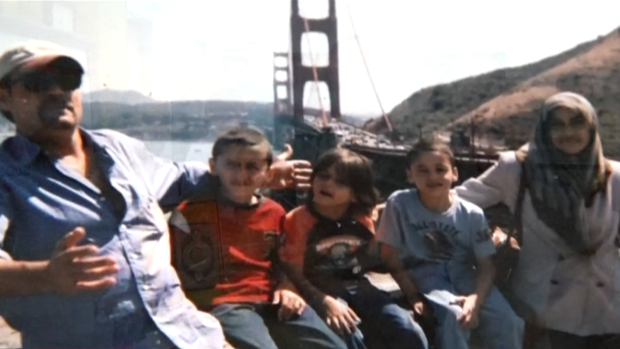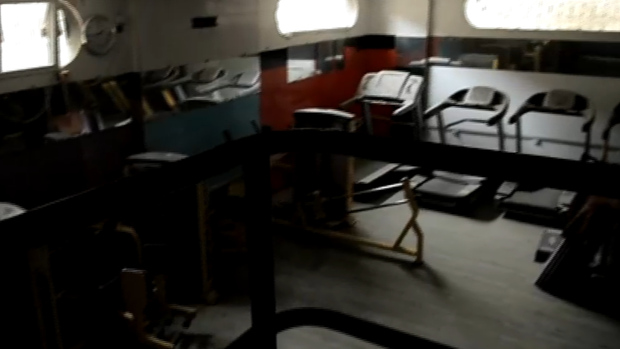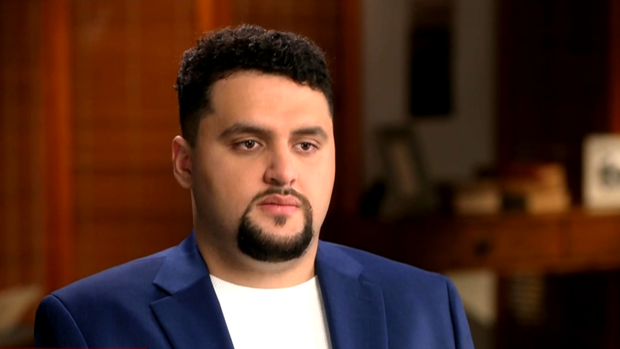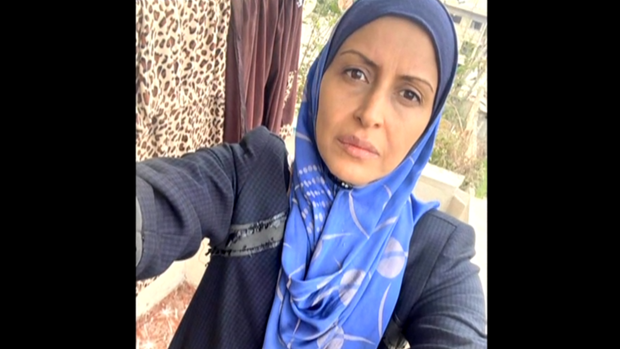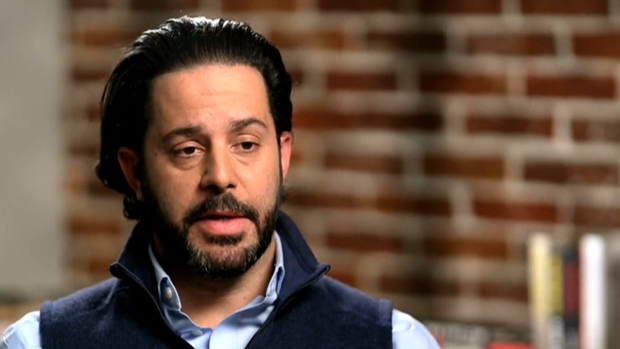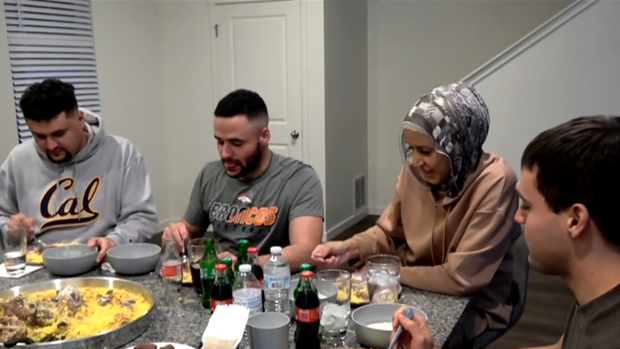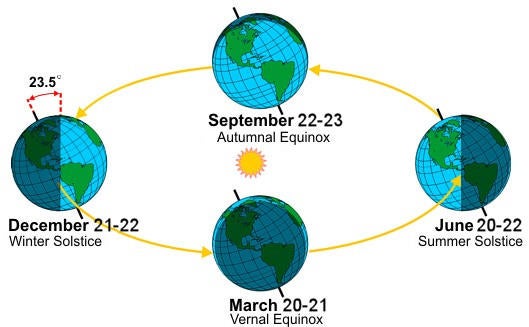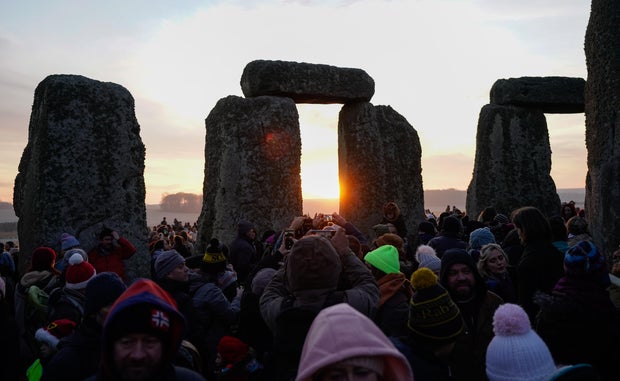CBS News
How a group of veterans helped a U.S. service member’s mother get out of war-torn Gaza
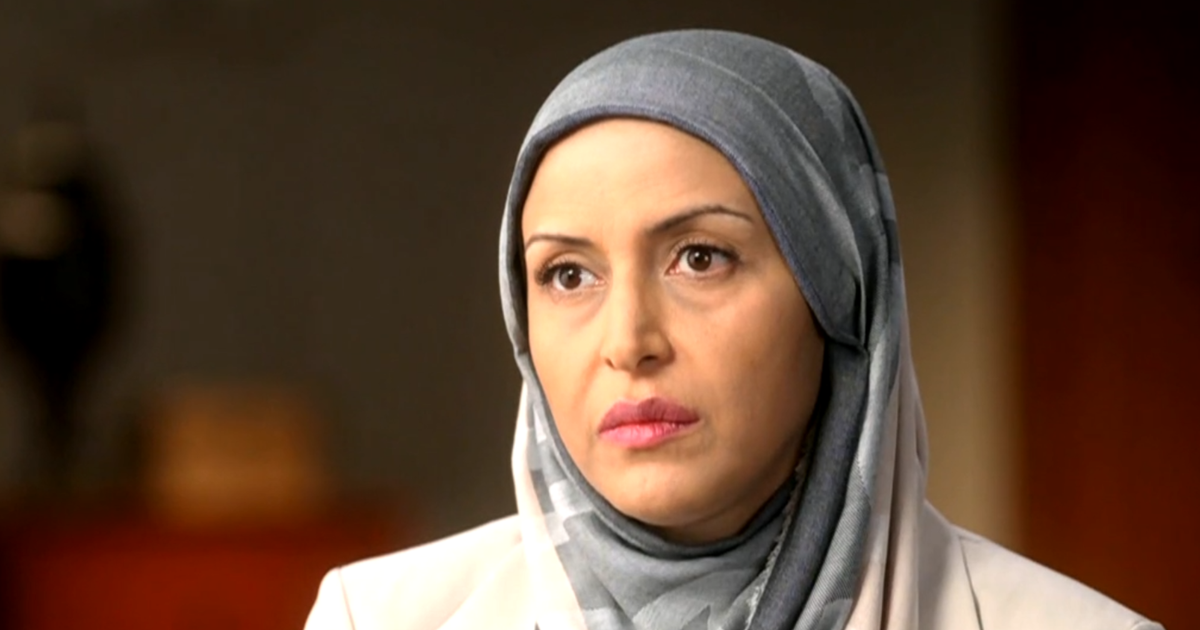
On this Mother’s day, we have a story from Gaza that’s unlike any we’ve heard before. Zahra Skaik, a 44-year-old Palestinian woman living in Gaza City, escaped the war thanks to her American sons — one of whom is an army specialist. Some of the things Zahra has to say about how Hamas and the Israeli army have been treating civilians are hard to hear — and even harder to confirm as the fighting continues and foreign journalists are largely barred from the area. But Zahra’s story, unlike so many that we’re learning about from the region, does have a somewhat happy ending.
We sat down with Zahra last month, and she told us she left Gaza in late December with nothing but a small backpack and the same clothes she’d been wearing since the war began.
Margaret Brennan: You didn’t bring anything from your home with you?
Zahra Skaik: No it’s, you know… if it’s not, you know, damaged, it’s burned.
Margaret Brennan: You couldn’t salvage anything?
Zahra Skaik: Yeah I mean, if you got out alive, it’s like, big thing for you.
In 1998, Zahra Skaik and her husband Abedalla moved from Gaza to the U.S., where their three sons were born. Ten years later the family returned to Gaza City. As their sons grew from little boys to young men, all three decided to live in the U.S., while Zahra and Abedalla remained in Gaza City.
After Hamas’s brutal attack on Israel on Oct. 7, Israel struck back and ordered over a million Palestinians in northern Gaza to head south as it prepared for a ground invasion.
Margaret Brennan: Why didn’t you leave?
Zahra Skaik: There’s no place to go there. We’re gonna just live on the street, you know? I mean, we don’t have anything to do with Hamas. So we’ll be safe… We know that every war, it comes and pass like you know, just a period of time… We didn’t know that this is going to be different.
Israeli forces invaded Gaza in late October. By mid-November, they were getting close to Zahra’s home. One day from the window of her building, Zahra says she saw at least four pedestrians and two cars carrying families blown up without warning as they tried to cross the street.
Zahra Skaik: And we tried to scream from the window, tell them, “no, don’t pass this light.” He didn’t even hear us, he just passed, and right away… you know, blow up… All the body, like that it was full in the car, and it have a lot of like mattress and like, that they’re moving they seems… and the woman just came, like, with all her, like, her body like full of blood… She’s the only one alive between her kids and the driver and like that… she start screaming and telling everybody, kill me, like again. Kill me with my kids…and with my family.
Margaret Brennan: Just to be clear, because intentionally firing on civilians–
Zahra Skaik: –Right.
Margaret Brennan: Or children could be a war crime.
Zahra Skaik: Right.
Margaret Brennan: Do you believe that was deliberate? Is that what you’re saying?
Zahra Skaik: Yeah, because I mean, pretty much happen front of me like that.
Margaret Brennan: Is it possible it was a mistake?
Zahra Skaik: How come? If it’s mistake from like, one part, what about the others… civilian just walking, two women just walking by, one boy… come on like, you know… there’s something like wrong about it.
When we asked about Zahra’s account, the Israel Defense Forces replied: “the IDF is not at war with civilians in Gaza. The IDF is at war with Hamas. Hamas has embedded itself in civilian infrastructure … the area referred to is an active combat zone and in order to mitigate harm to civilians an evacuation was carried out.”
At her home that evening, Zahra says, gunfire shattered the windows and shells hit the building.
Zahra Skaik: With all this like noise and with the shell start one after one like that we just start to crawl down downstairs… Just go down the first floor and hid somewhere.
Margaret Brennan: You and your husband?
Zahra Skaik: Yes.
Zahra Skaik While we’re crawling down, it’s like the shooting didn’t stop and the shells like one after one like that. And you feel your house start to burn… you know, because I mean everything is hot around you, you can’t even touch anything… The bomb kept going until the second day in the morning… you know, my husband start to like to fade because I mean, he’s diabetic. His sugar was low like that. So you know, something’s gonna happen to him if I didn’t get him out. That’s the, you know, the main thing I couldn’t get out like that, you know? Because I mean, all the rocks like that it covered the exit where we’re, like, hidden… So that what took me like a while like to get out… and it was three days passed.
Margaret Brennan: You were three days under the rubble?
Zahra Skaik: Yes. And it’s like miracle I swear. Like, you know, what happened to us, it’s like, it felt like, like you died and you just went back to life again.
With help from a neighbor, Abedalla walked with Zahra to a building owned by his family. In the lower-level of a weight-lifting center called the Super Gym, Abedalla’s brother and dozens of other relatives were taking shelter in a space with no electricity or running water, and one bathroom.
It was there that Zahra discovered Abedalla’s foot had been injured during the attack on their home. He was shivering from what appeared to be an infection. Due to fighting, it was days before she could get to a hospital.
Margaret Brennan: At the hospital, there were no antibiotics.
Zahra Skaik: Nothing.
Margaret Brennan: No painkillers.
Zahra Skaik: No. Not at all.
Margaret Brennan: They gave you nothing.
Zahra Skaik: Exactly.
Margaret Brennan: Because they had nothing.
Al Ahli Arab Hospital was overwhelmed with patients.
Zahra Skaik: While we’re like, waiting to get him into the operation, he passed away like while here sitting down.
Margaret Brennan: Waiting for the surgery.
Zahra Skaik: Right… I couldn’t believe it at first… The doctors kept talking… He told me you should be happy. And I said like, why I mean, why you’re saying like all that. He said because I mean, he passed here in the hospital, not in the street like others… so you should be happy… I didn’t like understand like that he’s gone, or you know, because I mean, he’s the only one for me in Gaza. And I felt that loneliness is like oh, like well, what’s gonna happen to me… So I started to hit him I swear like that–
Margaret Brennan: You hit the doctor, because of what he was saying.
Zahra Skaik: Yeah.
Margaret Brennan: Because he was telling you, you were lucky.
Zahra Skaik: Exactly… He’s just saying, I’ll let the people just come and pick him up and you know, but I couldn’t let go like that and I kept like holding him and everyone kept saying let go. I couldn’t that easy like that, it’s just, I don’t know.
At that point, Zahra’s eldest son Fadi was living in California. He’d been struggling to stay in touch with his parents.
Margaret Brennan: When you think about that last time, you were able to speak to your father. Do you remember a lot of it?
Fadi Sckak: I don’t think I’ll ever forget it…He was, you know, screaming on the, on the phone, you know, begging for mercy.
Fadi had been in touch with the U.S. embassy in Jerusalem to help get his parents out of Gaza. He was told the U.S. would try to get them permission to leave Gaza through the Rafah crossing in the south, but could not help them travel through the war zone to get there.
Margaret Brennan: That’s a very frustrating thing to be told. By the most powerful government in the world.
Fadi Sckak: Right.
Margaret Brennan: I can’t help you.
Fadi Sckak: Yeah. And I mean–
Margaret Brennan: As an American citizen.
Fadi Sckak: Yes.
His father’s death made him more determined to help his mother.
Fadi Sckak: After he passed, I knew that, you know, nothing matters more like to me than saving my mother from there. Because honestly, she did not deserve to go through that. I should have been the one there.
Back at the Super Gym, roughly a week after her husband died, Zahra says two armed men she believed to be from Hamas killed three palestinian women when civilians sheltering there defied the men’s orders to leave.
Zahra Skaik: Everybody was like, you know, didn’t believe what happened exactly that it just like, even if it happened in front of you… they said if like… if they’re Israelien people, yeah, like, we can believe it like that. But they’re one of us like, you know, where they’re Palestinian like us like, they’re doing this?
In an interview, the owner of the Super Gym denied that the incident happened there. So did a Hamas spokesman, who told us, “Hamas… has never attacked civilians.”
Margaret Brennan: Hamas says it is fighting for the Palestinian people. Islamic Jihad–
Zahra Skaik: –Right.
Margaret Brennan: Says they are fighting for the Palestinian people. Did you see, from what you witnessed, any help being given by these groups to the Palestinian people?
Zahra Skaik: Not at all, I swear. It’s like they’re careless about their people.
Increasingly desperate to get his mother out of Gaza, Fadi turned to the Michigan-based Arab American Civil Rights League.
Alicia Nieves: Our calls, our emails are of this, the most incredibly sad stories that you can imagine from Americans talking about their family who are in war in active, live combat.
One of their attorneys, Alicia Nieves, first learned about Zahra’s case in mid-December.
Margaret Brennan: How many Palestinian Americans that you know of are in a position like Fadi where they’re trying to get loved ones out now?
Alicia Nieves: There are thousands right now that are–
Margaret Brennan: Still?
Alicia Nieves: Yes.
Alicia Nieves: What struck me about Fadi’s case… was that it said that his brother was an active U.S. military member. And I thought at that moment, there was a possibility that something impossible could happen, which is we can actually get somebody from Northern Gaza.
Margaret Brennan: Why do you think the fact that his brother was active duty Army made a difference?
Alicia Nieves: Because I had experience in a previous conflict, where I was introduced to military veterans that were demonstrating a willingness and a capability to extract people from active conflict zones… I knew this was a time to make a call to the veterans that I knew, to see if there was any way that they could help in this situation.
Nieves connected with the Special Operations Association of America, an organization made up of former military and intelligence professionals who have experience volunteering to help civilians get out of conflict zones, including Afghanistan and Ukraine. But Gaza posed some unusual challenges, especially the part of Gaza City where Zahra Skaik was struggling to survive. But the rescue team started planning — and Fadi got through to his mother to tell her that help was on the way.
In December, Zahra Skaik sent a photo of herself to her eldest son Fadi, who told her a group of people she’d never met needed it to identify her – and rescue her from Gaza City.
Margaret Brennan: You must have thought, that’s impossible.
Zahra Skaik: Yeah… but when I saw the first message from Brian, yeah, this is one of the team… In that minute, I start to believe.
Alex Plitsas is a member of the special operations association team that took on Zahra’s case.
Margaret Brennan: So what was the situation on the ground when you began planning this escape? How intense was it?
Alex Plitsas: It was extremely intense at that point. Zahra was trapped behind Hamas lines in an enclave in Northern Gaza. So it was an active combat zone.
Plitsas is an army combat veteran and former counter-terrorism official at the Pentagon. He worked with former green berets, intelligence professionals, and a marine fluent in Arabic – all of whom were eager to help Zahra’s middle son Ragi Skaik, a 24-year-old army specialist who was serving in Korea while his mother was in Gaza.
Alex Plitsas: And so for us, it felt kind of personal. We just pictured ourself in those shoes.
Margaret Brennan: So why can’t the U.S. government do what you are doing?
Alex Plitsas: There are no U.S., government employees of any kind, either military or civilian on the ground inside Gaza… Having had experience in this type of work in government and understanding what the legalities are… we’re kind of able to step into the void and try to set it up the right way.
The group of special operators came together quickly in December. Just days before, Fadi Sckak had made a very public plea for his mother on U.S. television. Things started to fall into place around Christmas. Top officials at the state department reached out to Israeli and Egyptian officials to secure their support for the special operations team to carry out the mission.
Margaret Brennan: The Israeli military, just to be clear, had to help you get Zahra out of Gaza, is that correct?
CBS News
Alex Plitsas: We did need help from the Israeli government for approval to move inside of north Gaza… because it can be incredibly dangerous when you try to operate as an independent actor, especially in a war zone.
Margaret Brennan: So can you tell us some of the options you considered?
Alex Plitsas: Everything was on the table in terms of options to get them out… Hamas still had shoulder fired, you know, RPGs or small arms fire like AK-47s that could have hit helicopters and that that type of rescue really wasn’t feasible… And then you look at maritime options. Can you come in over the beach? And you realize as you start to move through, you have to eliminate some of these options that are not realistic.
Margaret Brennan: In this case, was someone driving up a car, a vehicle of some sort to move her around?
Alex Plitsas: That was really the only realistic option. But you can imagine, you know, trying to get cars and fuel inside Gaza is difficult.
Using satellite imagery, and coordinating with multiple governments, the team of operators carefully planned the mission.
Alex Plitsas: I was operating from an encrypted chat platform sitting in my living room in Connecticut. … My other teammates were kind of spread around the U.S., but collectively we worked our government contacts and they stepped in and helped.
But they called off the rescue twice because conditions on the ground weren’t right.
Margaret Brennan: This is crazy-making.
Zahra Skaik: Yeah, I know.
Margaret Brennan: You’re getting all excited and nervous, and then nothing happens.
Zahra Skaik: Right. But… they kept me like really like strong like that. Just telling you that I’m gonna take care of you like, you know, just no panic… I believe it from the first time like that. They will do something… they care about you. You know.
Margaret Brennan These are people you never met.
Zahra Skaik: Exactly, yeah.
Margaret Brennan: Thousands of miles away.
Zahra Skaik: Yeah.
Margaret Brennan: Who are trying to help get you out.
Zahra Skaik: Yeah, you see, it’s like words like can’t like express how much you know you need to thank them.
Margaret Brennan: When people hear the term special operators, they think of some out of the movie action scene. Is that what we should be picturing here in north Gaza?
Alex Plitsas: People have seen too many movies. They’re thinking, you know, you’re gonna see GI Joe show up in a giant truck. What you need are people who can blend in, in the area. So local national Palestinian Arabs who speak Arabic with a Gazan accent who are, have a reason to be where they’re supposed to be and everything else is, is really what you kind of need there to be quiet… That was who was at the heart of the operation.
A network of trusted drivers got Zahra Skaik – and her brother-in-law, who’s a U.S. citizen – out of Gaza City and all the way to Rafah.
Margaret Brennan: What are you seeing as you’re driving through North Gaza?
Zahra Skaik: You don’t know that this is Gaza or somewhere else like you know… There’s no street, there’s no buildings because you know it’s like all gravel.
Margaret Brennan: Destroyed.
Zahra Skaik: Gaza was like not Gaza anymore.
On Dec. 31, Zahra Skaik made it through the Rafah crossing into Egypt, where U.S. officials met her and expedited a green card for her. Her son Fadi met her in Cairo.
Fadi Sckak: You could just tell by looking at her she’s been through hell… I could literally see her bones. And it was very visible. And that was just, you know, I didn’t know what to say. But it was a very happy moment for me just to be able to be next to her. And to know that she’s safe.
CBS News
By February, Zahra Skaik and her sons were reunited in the U.S. This is the first Mother’s Day in 10 years that she’ll spend with all three of them.
Margaret Brennan: So if Zahra’s son hadn’t been in the US Army, what would’ve happened to Zahra?
Alex Plitsas: She’d still be stuck in north Gaza, along with a number of other folks with no means of getting south, no food, no water, no access to medicine, and whether she would still be alive at the moment, I simply couldn’t tell you.
We were able to confirm aspects of Zarah’s story through relatives, photos, and published accounts. But with the war still raging, we could not find a second witness to the incidents in which she describes what sound like war crimes against civilians, committed by both the Israeli army and Hamas.
Margaret Brennan: There are parts of what Zahra shared with us that are very hard to confirm. Do you think she’s telling us the truth?
Alex Plitsas: I find Zahra to be a wonderful human being. I think she’s a person of integrity… And I think for me to second guess her or the Israelis or Hamas or any of them, I would be speculating cause I wasn’t there. But I certainly don’t find her to be somebody who’s less than truthful.
Margaret Brennan: What do you hope people at home who hear your story understand about Gaza?
Zahra Skaik: We’re not just a number, you know, we’re like, a human being like that. I mean, we, like deserve, like, better life… the people like over Gaza. I mean, it’s not their choice to go through this war.
State Department officials say that so far they’ve helped get 1,800 people out of Gaza, most of them U.S. citizens or legal permanent residents. U.S. officials tell CBS news that there are “active interagency conversations” about what more the U.S. can do to help the Palestinian people caught in the crossfire like Zahra Skaik.
Andy Court and Annabelle Hanflig contributed reporting.
CBS News
Social Security Fairness Act passes U.S. Senate

Legislation to expand Social Security benefits to millions of Americans passed the U.S. Senate early Saturday and is now headed to the desk of President Joe Biden, who is expected to sign the measure into law.
Senators voted 76-20 for the Social Security Fairness Act, which would eliminate two federal policies that prevent nearly 3 million people, including police officers, firefighters, postal workers, teachers and others with a public pension, from collecting their full Social Security benefits. The legislation has been decades in the making, as the Senate held its first hearings into the policies in 2003.
“The Senate finally corrects a 50-year mistake,” proclaimed Senate Majority Leader Chuck Schumer, a Democrat from New York, after senators approved the legislation at 12:15 a.m. Saturday.
The bill’s passage is “a monumental victory for millions of public service workers who have been denied the full benefits they’ve rightfully earned,” said Shannon Benton, executive director for the Senior Citizens League, which advocates for retirees and which has long pushed for the expansion of Social Security benefits. “This legislation finally restores fairness to the system and ensures the hard work of teachers, first responders and countless public employees is truly recognized.”
The vote came down to the wire, as the Senate looked to wrap up its current session. Senators rejected four amendments and a budgetary point of order late Friday night that would have derailed the measure, given the small window of time left to pass it.
Vice President-elect JD Vance of Ohio was among the 24 Republican senators to join 49 Democrats to advance the measure in an initial procedural vote that took place Wednesday.
“Social Security is a bedrock of our middle class. You pay into it for 40 quarters, you earned it, it should be there when you retire,” Ohio Senator Sherrod Brown, a Democrat who lost his seat in the November election, told the chamber ahead of Wednesday’s vote. “All these workers are asking for is for what they earned.”
What is the Social Security Fairness Act?
The Social Security Fairness Act would repeal two federal policies — the Windfall Elimination Provision (WEP) and the Government Pension Offset (GPO) — that reduce Social Security payments to nearly 3 million retirees.
That includes those who also collect pensions from state and federal jobs that aren’t covered by Social Security, including teachers, police officers and U.S. postal workers. The bill would also end a second provision that reduces Social Security benefits for those workers’ surviving spouses and family members. The WEP impacts about 2 million Social Security beneficiaries and the GPO nearly 800,000 retirees.
The measure, which passed the House in November, had 62 cosponsors when it was introduced in the Senate last year. Yet the bill’s bipartisan support eroded in recent days, with some Republican lawmakers voicing doubts due to its cost. According to the Congressional Budget Office, the proposed legislation would add a projected $195 billion to federal deficits over a decade.
Without Senate approval, the bill’s fate would have ended with the current session of Congress and would have needed to be re-introduced in the next Congress.
CBS News
12/20: CBS Evening News – CBS News

Watch CBS News
Be the first to know
Get browser notifications for breaking news, live events, and exclusive reporting.
CBS News
Saturday is the winter solstice and 2024’s shortest day. Here’s what to know about the official start of winter.

The 2024 winter solstice, the shortest day of the year, happens on Saturday, Dec. 21, in the Northern Hemisphere. The celestial event signifies the first day of winter, astronomically.
What is the winter solstice?
The winter solstice is the day each year that has the shortest period of daylight between sunrise and sunset, and therefore the longest night. It happens when the sun is directly above the Tropic of Capricorn, a line of latitude that circles the globe south of the equator, the National Weather Service explains.
The farther north you are, the shorter the day will be, and in the Arctic Circle, the sun won’t rise at all.
How is the day of the winter solstice determined?
The winter solstice occurs because of the Earth’s tilt as it rotates around the sun.
When the Northern Hemisphere tilts away from the sun, the nights last longer. The longest night happens on the solstice because the hemisphere is in its furthest position from the sun. That occurs each year on Dec. 21 or 22.
This year, it falls on Dec. 21 at 4:21 a.m ET, to be precise.
On the summer solstice, when the northern tilt is closest to the sun, we have the longest day, usually June 20 or 21.
National Weather Service
The solstices are not always exactly on the 21st every year because the earth’s rotation around the sun is 365.25 days, instead of 365 even.
Will days start getting longer after the winter solstice?
Yes. Each day after the solstice, we get one minute more of sunlight. It doesn’t sound like much, but after just two months, or around 60 days, we’ll be seeing about an hour more of sunlight.
When will winter officially be over in 2025?
The meteorological winter ends on March 20, 2025. Then, spring will last until June 20, when the summer solstice arrives.
How is the winter solstice celebrated around the world?
Nations and cultures around the world have celebrated the solstice since ancient times with varying rituals and traditions. The influence of those solstice traditions can still be seen in our celebrations of holidays like Christmas and Hanukkah, Britannica notes.
The ancient Roman Saturnalia festival celebrated the end of the planting season and has close ties with modern-day Christmas. It honored Saturn, the god of harvest and farming. The multiple-day affair had lots of food, games and celebrations. Presents were given to children and the poor, and slaves were allowed to stop working.
Gatherings are held every year at Stonehenge, a monumental circle of massive stones in England that dates back about 5,000 years. The origins of Stonehenge are shrouded in mystery, but it was built to align with the sun on solstice days.
Andrew Matthews/PA Images via Getty Images
The Hopi, a Native American tribe in the northern Arizona area, celebrate the winter solstice with dancing, purification and sometimes gift-giving. A sacred ritual known as the Soyal Ceremony marks the annual milestone.
In Peru, people honor the return of the sun god on the winter solstice. The ancient tradition would be to hold sacrificial ceremonies, but today, people hold mock sacrifices to celebrate. Because Peru is in the Southern Hemisphere, their winter solstice happens in June, when the Northern Hemisphere is marking its summer solstice.
Scandinavia celebrates St. Lucia’s Day, a festival of lights.
The “arrival of winter,” or Dong Zhi, is a Chinese festival where family gathers to celebrate the year so far. Traditional foods include tang yuan, sweet rice balls with a black sesame filling. It’s believed to have its origins in post-harvest celebrations.
Researchers stationed in in Antarctica even have their own traditions, which may include an icy plunge into the polar waters. They celebrate “midwinter” with festive meals, movies and sometimes homemade gifts.


